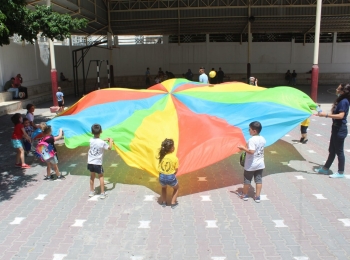The status of solidarity projects in the Holy Land
 Summer camp 2021
Summer camp 2021
After two very difficult years (2020-2021) due to the pandemic, the health situation seems to be slowly improving in Israel, where approximately 65% of the population is vaccinated. In Jordan and Palestine, vaccination and testing are lower (approximately 30% of the population is vaccinated), but despite this, even here the situation seems to be under control. On the economic side, unemployment is just 5% in Israel and about 25% in Jordan and Palestine, while in Gaza it reaches 50%.
Against this backdrop, pilgrimages have slowly resumed since Israel once again opened its doors to tourists in December. "The situation is volatile and can change at any time," Sami El-Yousef, administrative director of the Latin Patriarchate of Jerusalem, rightly says. During the meetings of the Grand Magisterium and the continental meetings of the Lieutenants, he thanked the Order of the Holy Sepulchre, stressing that the help brought by the Knights and Dames is essential, as well as the support regularly provided by the Grand Magisterium, which amounts to more than $750,000 monthly to support the daily life of the Patriarchate (schools, institutional expenses, seminary training, etc.).
Some 20 small projects had been funded in 2020, such as the restoration of a school playground in Jifna, Palestine, or the purchase of interactive whiteboards for various schools in the Patriarchate. Several major projects were also completed: the construction of a new house for the Sisters of the Rosary in Beit Jala, Palestine, and the renovation of the house of the Sisters of the Rosary in Marka, in Jordan.
For 2021, the Lieutenancies adopted twenty projects, primarily investment projects such as building classrooms in Mafraq, Jordan, renovating a study center in Al-Ahliyya, Palestine, and building a balcony for the sisters' house in Gaza, totaling approximately $1 million. Humanitarian and pastoral projects benefited from a considerable increase in funding: the former increased from $650,000 to $1 million for, among other things, medicines and health emergencies, subsidies for Iraqi refugees, social assistance, women's empowerment and job creation in Gaza. The second, from $340,000 to $500,000, for summer youth camps, spiritual retreats and Christian Student Youth leadership training.
The appeal launched by Cardinal Filoni to address the damage caused by Covid-19 made it possible - with more than three million dollars - to pay tuition in about forty schools, support families in about forty parishes with food parcels and create jobs in collaboration with Bethlehem University. In total, grants sent by the Grand Magisterium of the Order of the Holy Sepulchre have helped more than 20,000 people in need during these difficult times. In addition to this practical help, more than $1 million has been held in reserve to address the pandemic in 2022.
As for the Patriarchate's 44 schools, they have 1777 employees and nearly 19,000 students, but have lost more than 600 enrollees, mostly Christians. "The challenge is to be able to maintain these schools, bearers of the Christian values of dialogue and fraternity in our biblical territories," explained Sami El-Yousef, pointing out that with approximately 2,000 employees, the Latin Patriarchate of Jerusalem is the largest Christian employer in the Holy Land. Each year, the Order contributes nearly $4,800,000 toward school expenses so that children can continue to benefit from a high-quality education. This education offered in a Christian environment, welcomes young Muslims to grow together with other students in a spirit of mutual respect and understanding.
Bartholomew McGettrick, chairman of the Order of the Holy Sepulchre's Holy Land Commission, which closely monitors activities and projects in the Holy Land, told the Order's international meetings that the Commission hopes to visit the projects in early 2022. "The general strategy in our support of the Christian presence in the Holy Land remains the same: we focus on education, humanitarian aid and pastoral support. It is through these activities," he concluded, "that we promote an encounter with Christ, in today's world, by being with the most vulnerable: the children, the sick, the elderly and the needy."
(December 2021)












